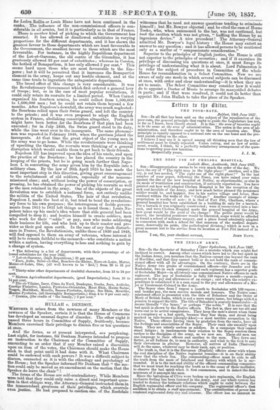MILLAR v. DENISON.
WE:ETHER it arises from the newness of many Members or the newness of the Speaker, certain it is that the House of Commons has developed an unusual degree of disorder. The other night it passed three hours in Committee of Supply, fruitlessly, because Members exercised their privilege to discuss five or ten questions at once.
And the forms, as at present interpreted, are perplexing. Last night, for instance' Sir Denham Norreys intended to propose an instruction to the Chairman of the Committee of Supply, amounting to an order that if any Member raised a discussion upon an item of the votes, the Chairman should make the House stick to that point until it had done with it. What Chairman could be endowed with such powers ? It was a difficult subject to discuss, connected as it is with the ethnology and psychology of the House; but the Speaker informed Sir Denham that "the motion could only be moved as an amendment on the motion that the Speaker do leave the chair " !
The forms of the House are self-contradictory. While Members were told that they could only raise a direct and important question in that oblique way, the Attorney-General instructed them in the transcendent greatness of their privileges, which overrule even justice. He had proposed to caution one of the Rochdale
witnesses that he need not answer questions tending to criminate himself ; but Mr. Bowyer objected ; and he cited the ease of Horne Tooke, who, when summoned to the bar, was not cautioned, but took the caution which was not given, "baffling the House by an ingenious device." A nice precedent ! The Attorney-General admitted Mr. Bovryer's legal history; the House may extort an answer to any question ; and it has allowed persons to be cautioned only as a matter of "compassionate consideration." Superior to the principles of English justice, the House is still not superior to the principles of acoustics; and if it exercises its privilege of discussing ten questions at once, it must forego its privilege of understanding what it is about. Lord Palmerston is to refer the subject of procedure in Committee of the whole House for reconsideration in a Select Committee. Now we are aware of only one mode in which several subjects can be discussed at once, with order and clear understanding—it is when they are set to music. The Select Committee may consider how it would do to appoint a Doctor of Music to arrange its manysided debates in parts ; and if that were resolved, it could not do better than appoint Mr. John Hullah to take the place of its Speaker.


























 Previous page
Previous page